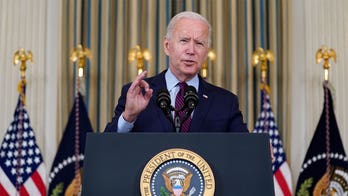
TAMPA, FL - JULY 13: Richard Everly, a research engineer in the nanotechnology research and education center at the University of South Florida, handles silicon wafers in a diffusion furnace on July 13, 2012 in Tampa, Florida. Tampa has opportunities for employers and employees in such high tech industry as agritechnology, aerospace, digital media, energy technologies, life sciences and medical technologies. The city will host the 2012 Republican National Convention at the Tampa Bay Times Forum August 27-30 where the party is expected to officially nominate former Massachusetts Gov. Mitt Romney as their nominee to face President Barack Obama in November in the general election. The convention will host 2,286 delegates and 2,125 alternate delegates from all 50 states, the District of Columbia and five territories as well as scores of journalists, guests and protesters. (Photo by Joe Raedle/Getty Images) (2012 Getty Images)
The spouses of as many as 100,000 high-skilled guest workers would also be allowed to work in the United States under a change proposed by the Obama administration.
The change, which will appear in the Federal Register this week, applies only to spouses of people who are here on H-1B high-skilled employment visas and are applying for permanent residence in the United States.
Obama administration officials touted the proposed change as a way to keep the United States globally competitive by making it a more attractive destination for people around the world who are trained in such fields as science, technology, engineering and math.
“The proposals announced today will encourage highly skilled, specially trained individuals to remain in the United States and continue to support U.S. businesses and the growth of the U.S. economy,” said Deputy Secretary of Homeland Security Alejandro Mayorkas in a statement.
“A concurrent goal is for the United States to maintain competitiveness with other countries that attract skilled foreign workers and offer employment authorization for spouses of skilled workers,” he said. “American businesses continue to need skilled nonimmigrant and immigrant workers.”
Supporters of the change said to Fox News Latino that it would motivate people from other nations to come here who otherwise would be reluctant to because of barriers their spouses would face to being able to work in the United States. Spouses of H-1B visa holders are not authorized, at present, to work in the United States.
“This change is not without precedent,” said immigration attorney Matthew Kolken, “as spouses of multinational managers, and investors are already able to apply for employment authorization.”
Another attorney, Susan Cohen, lauded the proposal, but said it should be even broader.
“The U.S. would be more competitive if we granted…spouses a blanket right to apply for employment authorization regardless of whether their H-1B spouse has started the green card process,” she said to FNL, “but at least it is a step in the right direction and this change should be welcomed and applauded.”
The H-1B visas for high-skilled workers are among the most sought-after by high-tech firms. Earlier this year the 85,000 H-1B visas available for 2015 were gobbled up in just a week. The same thing happened last year.
Proponents of stricter immigration laws quickly assailed the proposed change, calling it an end-run around Congress.
They have been particularly critical of Obama, who has put in place various initiatives aimed at giving breaks to some undocumented immigrants. The administration has characterized those initiatives as temporary reprieves while efforts to overhaul the U.S. immigration system remains stalled in Congress.
U.S. Sen. Jeff Sessions, an Alabama Republican and a senior member of the Senate Judiciary Committee and Ranking Member of the Budget Committee, said Obama was abusing his executive powers and hurting U.S. workers.
“Yet again, the administration is acting unilaterally to change immigration law in a way that hurts American workers,” Sessions said in a statement. “Fifty million working-age Americans aren’t working. Research shows as many as half of new technology jobs may be going to guest workers.”
“Yet the administration is now going to immediately add almost 100,000 new guest workers to compete against unemployed Americans—on top of the existing annual supply of approximately 700,000 guest workers and 1 million new permanent immigrant admissions,” the senator said.
“This will help corporations by further flooding a slack labor market, pulling down wages.”
The proposed changes will be open to 60 days of public comment before the administration can implement them.
A second proposed change the administration announced would extend the time that specialized workers from Chile, Singapore, Australia and the Northern Mariana Islands could stay here, among other things.
Immigration advocates have been pushing Obama to make substantive changes to immigration laws, including halting all deportations until and unless Congress acts on a comprehensive immigration bill.
Last June the Senate passed a bipartisan immigration reform measure that, among other things, tightened border security, expanded foreign worker visas and provided a path to citizenship for undocumented immigrants. But the effort has stalled in the House, where Republicans have a majority and several of them have vowed not to pass a bill that gives amnesty to people who have broken immigration laws.
The rule proposed Tuesday would not impact deportations, but could at least partially satisfy requests from the tech industry for the government to make it easier to attract and keep foreign workers trained in science, technology, engineering and math.
“If Republicans continue to block action on immigration reform, they cede the initiative to the Obama administration to take executive action,” said Frank Sharry, founder and executive director of America’s Voice, an organization that advocates for more flexible immigration policies. “This latest move is a classic example.”
“Republicans have tried to position themselves as champions of hi-tech companies,” Sharry said to Fox News Latino, “but their failure to pass reform that includes changes favored by both parties means that the Obama Administration can step in and save the day. Hard line opposition from the likes of Senator Sessions only makes it worse.”
The Associated Press contributed to this report.




